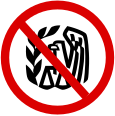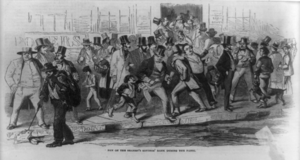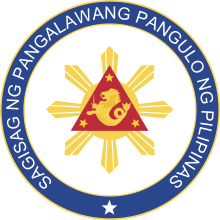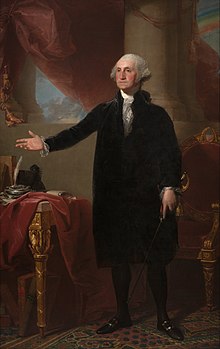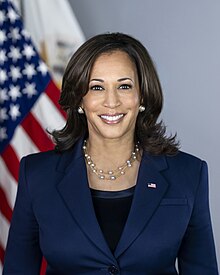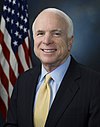| Main | Topics and categories | Tasks and projects |
The Politics portal
Politics (from Ancient Greek πολιτικά (politiká) 'affairs of the cities') is the set of activities that are associated with making decisions in groups, or other forms of power relations among individuals, such as the distribution of resources or status. The branch of social science that studies politics and government is referred to as political science.
It may be used positively in the context of a "political solution" which is compromising and non-violent, or descriptively as "the art or science of government", but also often carries a negative connotation. The concept has been defined in various ways, and different approaches have fundamentally differing views on whether it should be used extensively or in a limited way, empirically or normatively, and on whether conflict or co-operation is more essential to it.
A variety of methods are deployed in politics, which include promoting one's own political views among people, negotiation with other political subjects, making laws, and exercising internal and external force, including warfare against adversaries. Politics is exercised on a wide range of social levels, from clans and tribes of traditional societies, through modern local governments, companies and institutions up to sovereign states, to the international level.
In modern nation states, people often form political parties to represent their ideas. Members of a party often agree to take the same position on many issues and agree to support the same changes to law and the same leaders. An election is usually a competition between different parties.
A political system is a framework which defines acceptable political methods within a society. The history of political thought can be traced back to early antiquity, with seminal works such as Plato's Republic, Aristotle's Politics, Confucius's political manuscripts and Chanakya's Arthashastra. (Full article...)
Selected article
The FairTax is a proposed change to the tax laws of the United States that would replace the Internal Revenue Service (IRS) and all federal income taxes (including corporate taxes and capital gains taxes), as well as payroll taxes (including Social Security and Medicare taxes), gift taxes, and estate taxes with a national retail sales tax. Its enacting legislation, the Fair Tax Act, is pending in the United States Congress. The tax would be levied once at the point of purchase on all new goods and services. The proposal also calls for a monthly payment to all households of citizens and legal resident aliens (based on family size) as an advance rebate of tax on purchases up to the poverty level. The sales tax rate, as defined in the legislation, is 23% of net prices which includes the tax (23¢ out of every $1 spent—calculated like income taxes), which is comparable to a 30% traditional sales tax (23¢ on top of every 77¢ spent). With the rebate taken into consideration, the effective tax rate would be progressive on consumption and could result in a federal tax burden of zero or less. However, opponents of the tax argue that while progressive on consumption, the tax would be regressive on income, and would accordingly decrease the tax burden on high income earners and increase the tax burden on the middle class.
Featured picture
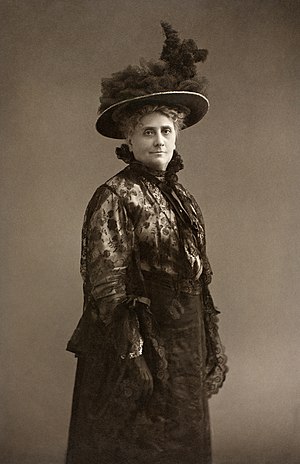
Gina Krog (20 June 1847 – 14 April 1916) was a Norwegian suffragist, teacher, liberal politician, writer and editor. She played a central role in the Norwegian women's movement from the 1880s until her death, notably as a leading campaigner for women's right to vote. In 1884, Krog co-founded the Norwegian Association for Women's Rights with liberal MP Hagbart Berner. Over the next two decades, Krog co-founded the Women's Voting Association, the National Association for Women's Suffrage, and the Norwegian National Women's Council, spearheading the presentation of women's suffrage proposals to the Storting (the Norwegian parliament). She was an early member of the Liberal Party and served as a deputy member of its national board.
Selected quote
Selected biography
John Sidney McCain III (1936-2018) was the senior United States Senator from Arizona. He was the Republican nominee for president in the 2008 United States election. During the Vietnam War, he nearly lost his life in the 1967 USS Forrestal fire. In October 1967, while on a bombing mission over Hanoi, he was shot down, seriously injured, and captured by the North Vietnamese. He was a prisoner of war until 1973. McCain experienced episodes of torture, and refused an out-of-sequence early repatriation offer. His war wounds left him with lifelong physical limitations. While generally adhering to conservative principles, McCain at times has had a media reputation as a "maverick" for his willingness to disagree with his party on certain issues. He secured the Republican nomination in 2008 after coming back from early reversals, but lost to Democratic candidate Barack Obama in the general election.
Did you know (auto-generated) -

- ... that Nargess Eskandari-Grünberg, the new mayor of Frankfurt, gave birth to her first child while a political prisoner in the wake of the Iranian Revolution?
- ... that after its merger with India, the last raja of Jubbal State joined the Indian Foreign Service?
- ... that the 2009 book Where Heaven and Earth Meet introduced the term "Sacred Esplanade" as a politically neutral term for the religious site in Jerusalem known as al-Haram al-Sharif or the Temple Mount?
- ... that reporter O. Kay Henderson, who has interviewed U.S. presidential candidates, is considered by national media to be an Iowa political authority?
- ... that prior to entering politics, Bonifasius Belawan Geh collected edible bird's nests from the jungle after dropping out of college?
- ... that Ken Russell went on international yo-yo tours before turning to politics?
More did you know...
- ...that the phrase "lipstick on a pig" may have its origins in the 18th-century expression "A hog in armour is still but a hog"?
- ...that the Pirate Party of the United States was formed after a 2006 raid by the Swedish police on the servers of The Pirate Bay, a popular file sharing website?
- ...that Andrey Kirillovich Razumovsky, at the time Ambassador of the Russian Empire to the Austrian Empire, commissioned three string quartets from Beethoven?
- ...that Matt Taibbi's book Griftopia has been described as a "necessary ... corrective" to the assertion that bubbles are an inevitable part of the market economy?
- ...that in the book Net.wars, author Wendy M. Grossman attributes Internet conflict in the 1990s to culture shock from an influx of users?
- ...that former California Assembly Republican Leader and California Republican Party Chair Robert W. Naylor was editor of The Stanford Daily while he was a student at Stanford University?
- ...that the UK's Workers Socialist Federation began as a suffragette group?
- ...that the Proletarian Revolutionary Organisation of Nepal proposed a synthesis of Buddhism and Maoism in 1977?
In this month
- June 28, 2004 - Canadian federal elections occur; the Liberal party loses its absolute majority.
News and Current events
- August 11: 4 local government areas in New South Wales, Australia locked down after COVID-19 case
- August 11: Australia: AstraZeneca vaccine access expanded by Victorian government
- August 1: Australia: Victorian lockdown lifted
- July 29: Tunisia's president dismisses prime minister, suspends parliament
- July 25: Australia: Wikinews interviews Reg Kidd, mayor of the City of Orange, about COVID-19 lockdown and local government
- July 23: South Australia enters week-long lockdown to contain COVID-19 Delta variant spread
- July 21: Technological University Dublin senior lecturer Dr Lorcan Sirr speaks to Wikinews on housing market in Ireland
- July 21: Three rural councils in New South Wales, Australia enter 7-day lockdown
- July 21: Australia: Victoria lockdown extended by a week with 85 active cases recorded
- July 15: California governor signs new state budget, eligible Californians to get stimulus payments
Topics and categories
General images
Related portals
Associated Wikimedia
The following Wikimedia Foundation sister projects provide more on this subject:
-
Commons
Free media repository -
Wikibooks
Free textbooks and manuals -
Wikidata
Free knowledge base -
Wikinews
Free-content news -
Wikiquote
Collection of quotations -
Wikisource
Free-content library -
Wikiversity
Free learning tools -
Wiktionary
Dictionary and thesaurus
